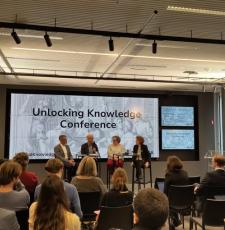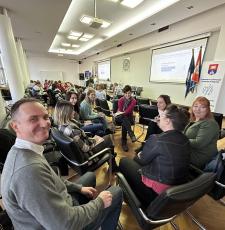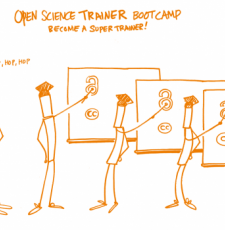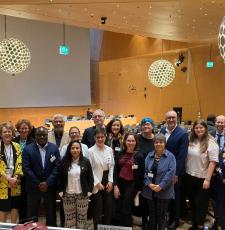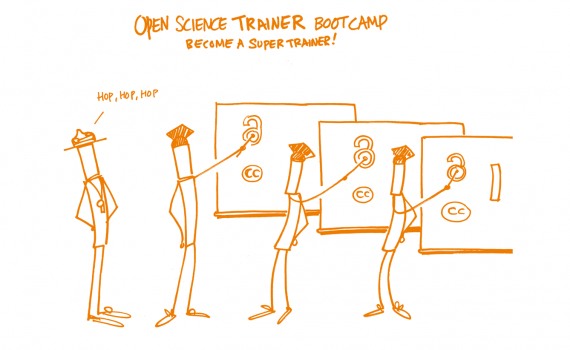
Enhancing open science and open research skills in our partner countries is among EIFL’s strategic objectives, and one of the ways in which we aim to achieve this is by organizing train-the-trainer activities for open science trainers. EIFL Open Access Programme Manager, Iryna Kuchma, was one of the facilitators of the second EIFL Open Science Train-the-Trainer Bootcamp, which took place from 13 - 17 November 2023.
The invitation targeted librarians, research support staff and other professionals in our partner countries who were planning to deliver open science training for researchers and students, and who wanted to strengthen their training skills. There was keen interest and we were able to enroll 52 trainers from 19 countries, in Africa, Asia Pacific and Europe (Botswana, Côte d'Ivoire, Ethiopia, Fiji, Georgia, Ghana, Kenya, Kyrgyzstan, Lesotho, Lithuania, Malawi, Nepal, North Macedonia, Senegal, Serbia, Slovenia, Tanzania, Ukraine and Zimbabwe).
I am delighted to report that the participants were all fully satisfied with the quality and usefulness of the bootcamp content and delivery by trainers, and say they will recommend this bootcamp to others.
All the bootcamp materials are openly available at https://openplato.eu/course/view.php?id=62. They cover different open science topics - open access publishing, right retention, open licensing, preprints, open peer review, repositories, research data management, open data, preregistration and registered reports, reproducible code and open research software. There are also training and train-the-trainer tips, including a list of 'serious' games linked to open science, and free and open source tools for interactive training.
WHAT THE PARTICIPANTS SAID
About the course
“All the topics I learnt in this training were relevant to my institution's open science training goals. And I am better equipped to engage in research about open science.” - participant from University of Gaston Berge in Senegal.
How will the course affect their work?
“As a librarian, this will make a great difference because the skills I have acquired will equip me as a trainer, I will have more confidence when I will be presenting, and most importantly I will know what to put in my presentation depending on my audience.” - participant from Mzuzu University in Malawi.
“The training enhanced my knowledge and skills in open science and in developing training materials on open science. I intend to use what I learnt for teaching undergraduate and postgraduate students. The knowledge and skills on open science will also improve my research work through access to information and publishing the findings. In addition, the training content is going to support my PhD studies through proper data management and enhancing access.” - another participant from Mzuzu University, Malawi.
“I’m going to use exercises and open source tools that were presented to us during the bootcamp. I believe this training will help to improve my performance at work.” - participant from the American University of Central Asia, Kyrgyzstan.
“First of all, this bootcamp has provided me with valuable knowledge and an opportunity to take a fresh look at the training we offer to the university community. It would be worth revisiting our training topics, complementing them and orienting them according to the needs of the audience. In addition, we will try to incorporate more ways of engaging the audience.” - participant from the Kaunas University of Technology in Lithuania.
“Training curriculum design will become much easier for me.The training content has been made freely available to use and I need not reinvent the wheel.The tools and resources for gamification and creation of awareness-raising campaigns will help me to create engaging content to whip up the interest and participation of my community members in open science.I can now prove with scientific evidence that self-archiving truly does increase access to and use of research publications; very useful when making the case for researchers at my university to self-archive their research products in our institutional repository. I can also demonstrate the critical importance of ORCID using real-life scenarios.” - participant from the University of Health and Allied Sciences in Ghana.
“I have gained more insight on creating engaging training, utilizing various tools and applications we have been taught. I am also now in a better position to provide my trainees with resources that I also obtained from the training that I never knew about. Further to this I would also like to transfer all the knowledge that I gained to my colleagues as well as others who are not library staff. Would also want to put Research Data Management into practice.” - participant from Gwanda State University in Zimbabwe.
“Anticipating the impact of today's learning, I believe the insights gained from the EIFL Train-The-Trainer Bootcamp, especially regarding open access, will significantly elevate my ability to advocate for and implement open access initiatives within my work. This newfound knowledge equips me with practical strategies and a broader perspective, allowing me to make a positive difference in promoting accessible and inclusive academic resources.” - participant from Midlands State University in Zimbabwe.
II would like to thank my fellow bootcamp facilitators, Jonathan England, Mirjana Nešić, Irena Nježić, Ljiljana Radisavljević, Milica Ševkušić and Obrad Vučkovac. This is the second EIFL Train-the-Trainer Bootcamp for 2023 - read about our first bootcamp.
What's next?
Next year (2024) we plan to organize and host monthly online events for open science trainers to share their training experiences and to further advance open science training in our partner institutions and countries. We look forward to seeing all our 2023 bootcamp alumni and meeting more open science trainers from our partner countries during these events.
SHARE / PRINT






